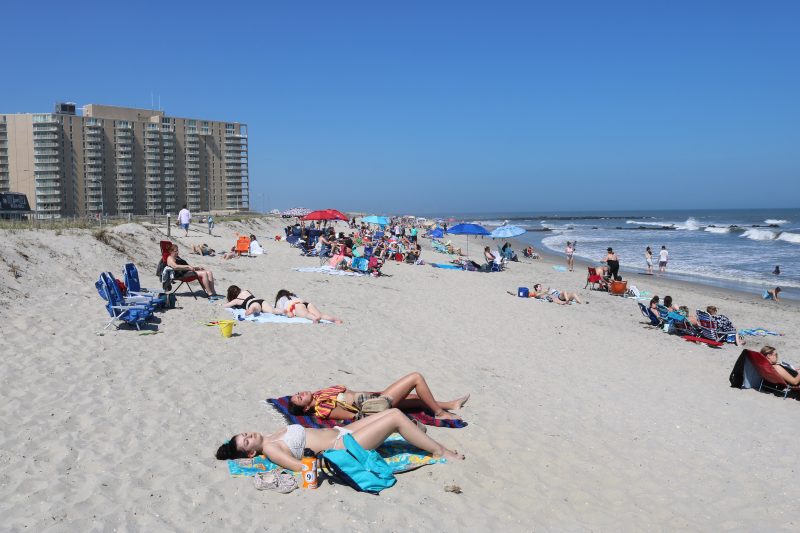 By DONALD WITTKOWSKI
By DONALD WITTKOWSKI
Cape May County is touting itself as the “Comeback Kid” of New Jersey’s tourism industry after fully recovering from COVID-19 shutdowns that sent spending and the number of visitors in the seashore communities plummeting in 2020.
In 2021, the county pulled in 96 percent of the record $6.9 billion in tourism-related revenue that it had in 2019 – the year before the pandemic struck and New Jersey went into a virtual lockdown for business and visitation, newly released figures show.
Overall, tourism revenue surged to $6.6 billion in 2021 compared to $5.4 billion in 2020, Cape May County officials announced Wednesday during an upbeat tourism conference that also included a strong forecast for the upcoming summer vacation season at the shore.
“We had a golden 2021. So, if we can get 2021 again, we’re golden,” Cape May County Tourism Director Diane Wieland predicted of the 2022 summer season.
Wieland called the county’s tourism industry the “Comeback Kid” after it jumped by 22.5 percent last year over the pandemic-depressed levels in 2020.
“It looks very strong. There’s that pent-up demand,” she said in an interview.
https://vimeo.com/699528965/692b9d896e
(Cape May County Tourism Department promotional video)
The county is on track to exceed its record-high 2019 levels in 2022 if the current trajectory continues to hold throughout the year, according to a news release.
Cape May County Commission Director Gerald M. Thornton, liaison to the Tourism Department, was no less sanguine about the county’s dramatic rebound from the pandemic-related slump in 2020.
“Honestly, we have really made a wonderful recovery, if you look at it,” Thornton said during the tourism conference in Cape May Court House.
Thornton formed a Recovery Task Force just as the county began emerging from New Jersey’s pandemic lockdowns to help reopen the economy and reinvigorate the tourism industry. He praised Cape May County Commissioner Leonard Desiderio, who is also the mayor of Sea Isle City, and Commissioner Will Morey for leading the task force.
“They did a tremendous job of getting a plan together for reopening and creating our ‘Safely Together’ messaging. We continued to evolve the message and pour additional resources into marketing to get Cape May County to where it is today,” Thornton said in a statement.
In one key positive trend, direct tourism employment bounced back in 2021. The latest data from New Jersey shows that direct employment was up to 28,304 last year, which is over the record year of 2019 at 26,981 and significantly higher than the 23,265 in 2020, figures show.
Further underscoring the county’s recovery in tourism, the number of visitors to Cape May County jumped by nearly 29 percent in 2021 compared to 2020. Altogether, there were 10.3 million visitors in 2021. The number of visitors in 2021 even surpassed the previous record year of 2019 by 1 percent.
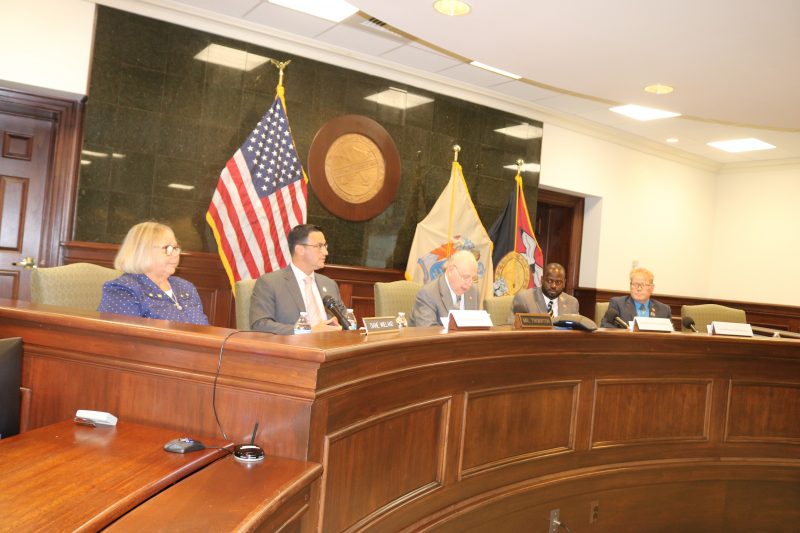
From left, speakers at the tourism conference include Cape May County Tourism Director Diane Wieland, Sen. Michael Testa, Cape May County Commission Director Gerald Thornton, Assemblyman Antwan McClellan and Assemblyman Erik Simonsen.
Jeff Vasser, director of the New Jersey Division of Travel and Tourism, said Cape May County has taken the lead and served as a model for other counties looking to rebound from the pandemic.
“They have come back stronger and better than any other county,” Vasser said at the tourism conference.
Wieland said visitor surveys show there is strong loyalty among tourists for the seashore resorts and other Cape May County destinations as their favorite vacation spot. Overall, the visitor return rate is 90 percent, she pointed out.
Moreover, nearly 30 percent of the visitors take one-week vacations in Cape May County, compared to an average of 3.5 days for vacation stays nationwide. In addition, nearly 40 percent of the county’s tourists have been visiting for more than 20 years, figures show.
“These are people who love it and come back every year,” Wieland said. “This is where they go.”
According to a news release, Cape May County’s lodging industry last year surpassed the occupancy tax collection rate of 2019, which was a record year, and “smashed” the rate of collection in pandemic-depressed 2020.
Based on the year-end occupancy tax collection report for 2021, the county saw an increase in collection over 2020 of 63.4 percent and an increase of 24.5 percent over 2019, the release stated.
The occupancy tax is a 5 percent charge levied on hotel, motel and bed and breakfast room rates and serves as a metric to measure overnight stays.
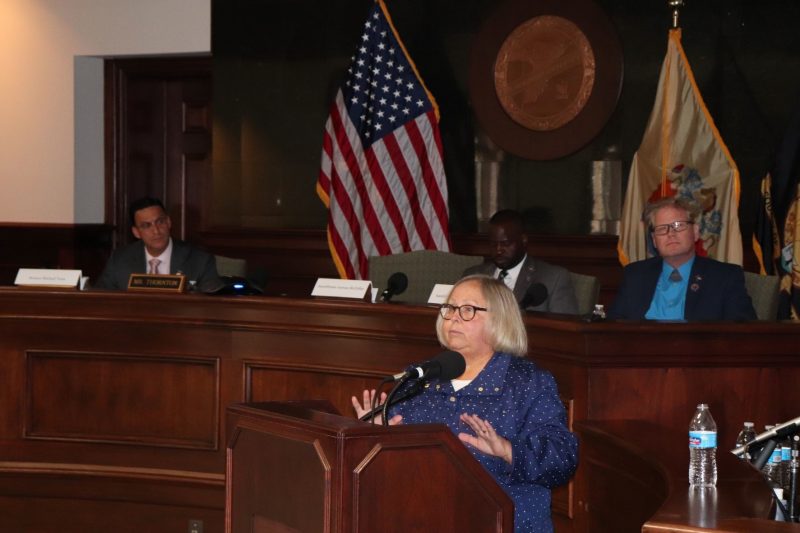
Cape May County Tourism Director Diane Wieland is predicting a strong summer season for 2022. (Photo courtesy of Cape May County)
New Jersey, Pennsylvania and New York continue to be the primary feeder markets for Jersey Cape tourism. Tourism officials are trying to tap other markets as well, including attracting more travelers from Canada now that the U.S.-Canadian border has reopened following a nearly two-year shutdown for the pandemic.
Wieland noted that the county will be marketing to Canadian tourists in Quebec province, Montreal and the Toronto area to get them to visit the Jersey Cape. The county launched a “Reconnect Canada” advertising campaign at the beginning of the year primarily aimed at visitors in Quebec province.
On average, tourists from Quebec represented 7 to 9 percent of Cape May County’s visitor base in July and August in previous years, Wieland said.
“They love the beach, they love shopping, they love the outdoors,” she said of Canadian visitors.
Overall, surveys show that the beaches continue to be the county’s top tourist attraction, followed by dining, shopping, the boardwalks, wineries and breweries, the Cape May County Zoo, historical and cultural sites and eco-tourism.
County officials emphasized that the Jersey Cape area has diversified its attractions well beyond the ever-popular beaches and family-friendly boardwalks.
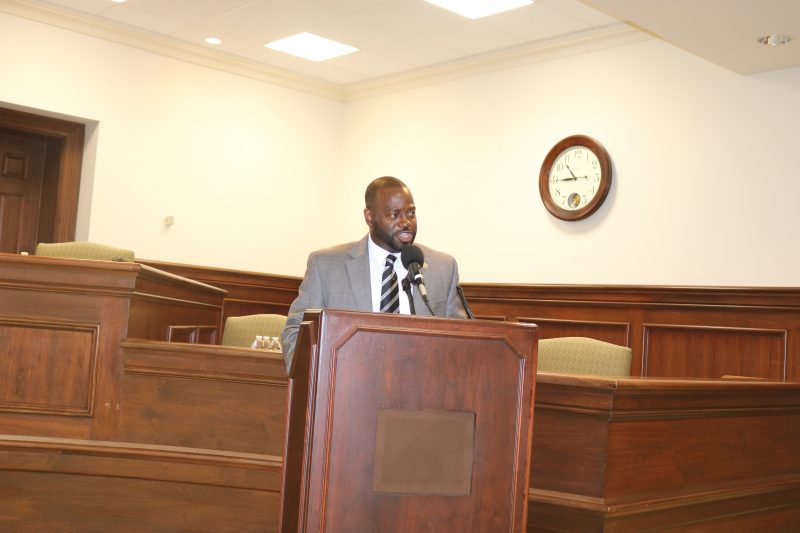
State Assemblyman Antwan McClellan discusses some of the county's attractions that go beyond the traditional beaches and boardwalks.
State Assemblyman Antwan McClellan, whose First Legislative District includes Cape May County, sponsored legislation to create the Black Heritage History Trail in New Jersey. McClellan said the Black Heritage History Trail is another example of how the county has broadened its tourism attractions.
The trail will start at the Harriet Tubman Museum in Cape May. Tubman, the famed abolitionist, funded her Underground Railroad voyages by working in Cape May.
McClellan and fellow First Legislative District team members Sen. Michael Testa and Assemblyman Erik Simonsen attended the tourism conference and strongly pledged their support for Cape May County’s tourism-based economy.
They explained that the county gets only a small amount of state funding for infrastructure projects in return for the hundreds of millions of tourism tax revenue it sends each year to Trenton.
“We love living at the bottom of the state, but hate being treated like the bottom of the barrel,” Simonsen said while criticizing the state’s treatment of Cape May County.
The First Legislative District team is planning to introduce legislation that would require the state to return 50 percent of the tourism tax revenue generated by Cape May County back to the county for infrastructure investment, Testa said.
“I really think that it’s time that Cape May County gets her fair share,” Testa said, drawing applause from the audience at the tourism conference.
Cape May County’s Tourism Economic Impact Report can be found at Post Covid Tourism Recovery (capemaycountynj.gov)
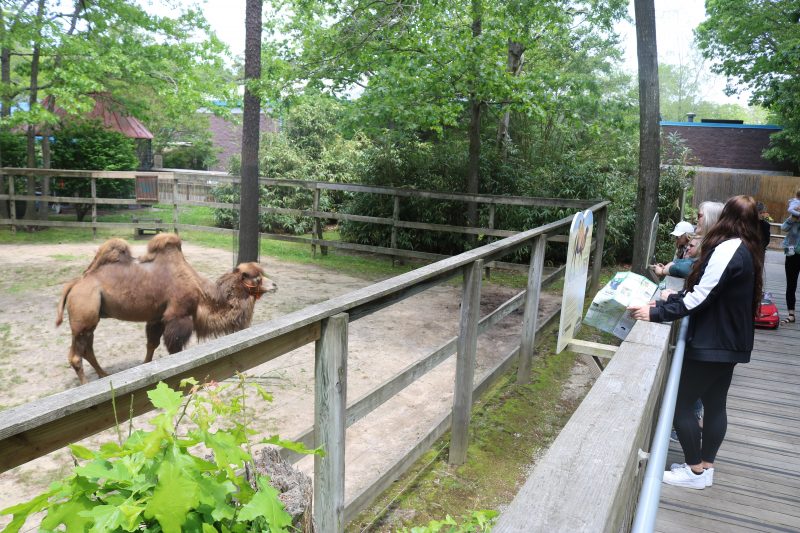
The Cape May County Zoo is among the county's top draws for tourists.
 By DONALD WITTKOWSKI
Cape May County is touting itself as the “Comeback Kid” of New Jersey’s tourism industry after fully recovering from COVID-19 shutdowns that sent spending and the number of visitors in the seashore communities plummeting in 2020.
In 2021, the county pulled in 96 percent of the record $6.9 billion in tourism-related revenue that it had in 2019 – the year before the pandemic struck and New Jersey went into a virtual lockdown for business and visitation, newly released figures show.
Overall, tourism revenue surged to $6.6 billion in 2021 compared to $5.4 billion in 2020, Cape May County officials announced Wednesday during an upbeat tourism conference that also included a strong forecast for the upcoming summer vacation season at the shore.
“We had a golden 2021. So, if we can get 2021 again, we’re golden,” Cape May County Tourism Director Diane Wieland predicted of the 2022 summer season.
Wieland called the county’s tourism industry the “Comeback Kid” after it jumped by 22.5 percent last year over the pandemic-depressed levels in 2020.
“It looks very strong. There’s that pent-up demand,” she said in an interview.
https://vimeo.com/699528965/692b9d896e
(Cape May County Tourism Department promotional video)
The county is on track to exceed its record-high 2019 levels in 2022 if the current trajectory continues to hold throughout the year, according to a news release.
Cape May County Commission Director Gerald M. Thornton, liaison to the Tourism Department, was no less sanguine about the county’s dramatic rebound from the pandemic-related slump in 2020.
“Honestly, we have really made a wonderful recovery, if you look at it,” Thornton said during the tourism conference in Cape May Court House.
Thornton formed a Recovery Task Force just as the county began emerging from New Jersey’s pandemic lockdowns to help reopen the economy and reinvigorate the tourism industry. He praised Cape May County Commissioner Leonard Desiderio, who is also the mayor of Sea Isle City, and Commissioner Will Morey for leading the task force.
“They did a tremendous job of getting a plan together for reopening and creating our ‘Safely Together’ messaging. We continued to evolve the message and pour additional resources into marketing to get Cape May County to where it is today,” Thornton said in a statement.
In one key positive trend, direct tourism employment bounced back in 2021. The latest data from New Jersey shows that direct employment was up to 28,304 last year, which is over the record year of 2019 at 26,981 and significantly higher than the 23,265 in 2020, figures show.
Further underscoring the county’s recovery in tourism, the number of visitors to Cape May County jumped by nearly 29 percent in 2021 compared to 2020. Altogether, there were 10.3 million visitors in 2021. The number of visitors in 2021 even surpassed the previous record year of 2019 by 1 percent.
By DONALD WITTKOWSKI
Cape May County is touting itself as the “Comeback Kid” of New Jersey’s tourism industry after fully recovering from COVID-19 shutdowns that sent spending and the number of visitors in the seashore communities plummeting in 2020.
In 2021, the county pulled in 96 percent of the record $6.9 billion in tourism-related revenue that it had in 2019 – the year before the pandemic struck and New Jersey went into a virtual lockdown for business and visitation, newly released figures show.
Overall, tourism revenue surged to $6.6 billion in 2021 compared to $5.4 billion in 2020, Cape May County officials announced Wednesday during an upbeat tourism conference that also included a strong forecast for the upcoming summer vacation season at the shore.
“We had a golden 2021. So, if we can get 2021 again, we’re golden,” Cape May County Tourism Director Diane Wieland predicted of the 2022 summer season.
Wieland called the county’s tourism industry the “Comeback Kid” after it jumped by 22.5 percent last year over the pandemic-depressed levels in 2020.
“It looks very strong. There’s that pent-up demand,” she said in an interview.
https://vimeo.com/699528965/692b9d896e
(Cape May County Tourism Department promotional video)
The county is on track to exceed its record-high 2019 levels in 2022 if the current trajectory continues to hold throughout the year, according to a news release.
Cape May County Commission Director Gerald M. Thornton, liaison to the Tourism Department, was no less sanguine about the county’s dramatic rebound from the pandemic-related slump in 2020.
“Honestly, we have really made a wonderful recovery, if you look at it,” Thornton said during the tourism conference in Cape May Court House.
Thornton formed a Recovery Task Force just as the county began emerging from New Jersey’s pandemic lockdowns to help reopen the economy and reinvigorate the tourism industry. He praised Cape May County Commissioner Leonard Desiderio, who is also the mayor of Sea Isle City, and Commissioner Will Morey for leading the task force.
“They did a tremendous job of getting a plan together for reopening and creating our ‘Safely Together’ messaging. We continued to evolve the message and pour additional resources into marketing to get Cape May County to where it is today,” Thornton said in a statement.
In one key positive trend, direct tourism employment bounced back in 2021. The latest data from New Jersey shows that direct employment was up to 28,304 last year, which is over the record year of 2019 at 26,981 and significantly higher than the 23,265 in 2020, figures show.
Further underscoring the county’s recovery in tourism, the number of visitors to Cape May County jumped by nearly 29 percent in 2021 compared to 2020. Altogether, there were 10.3 million visitors in 2021. The number of visitors in 2021 even surpassed the previous record year of 2019 by 1 percent.
 From left, speakers at the tourism conference include Cape May County Tourism Director Diane Wieland, Sen. Michael Testa, Cape May County Commission Director Gerald Thornton, Assemblyman Antwan McClellan and Assemblyman Erik Simonsen.
Jeff Vasser, director of the New Jersey Division of Travel and Tourism, said Cape May County has taken the lead and served as a model for other counties looking to rebound from the pandemic.
“They have come back stronger and better than any other county,” Vasser said at the tourism conference.
Wieland said visitor surveys show there is strong loyalty among tourists for the seashore resorts and other Cape May County destinations as their favorite vacation spot. Overall, the visitor return rate is 90 percent, she pointed out.
Moreover, nearly 30 percent of the visitors take one-week vacations in Cape May County, compared to an average of 3.5 days for vacation stays nationwide. In addition, nearly 40 percent of the county’s tourists have been visiting for more than 20 years, figures show.
“These are people who love it and come back every year,” Wieland said. “This is where they go.”
According to a news release, Cape May County’s lodging industry last year surpassed the occupancy tax collection rate of 2019, which was a record year, and “smashed” the rate of collection in pandemic-depressed 2020.
Based on the year-end occupancy tax collection report for 2021, the county saw an increase in collection over 2020 of 63.4 percent and an increase of 24.5 percent over 2019, the release stated.
The occupancy tax is a 5 percent charge levied on hotel, motel and bed and breakfast room rates and serves as a metric to measure overnight stays.
From left, speakers at the tourism conference include Cape May County Tourism Director Diane Wieland, Sen. Michael Testa, Cape May County Commission Director Gerald Thornton, Assemblyman Antwan McClellan and Assemblyman Erik Simonsen.
Jeff Vasser, director of the New Jersey Division of Travel and Tourism, said Cape May County has taken the lead and served as a model for other counties looking to rebound from the pandemic.
“They have come back stronger and better than any other county,” Vasser said at the tourism conference.
Wieland said visitor surveys show there is strong loyalty among tourists for the seashore resorts and other Cape May County destinations as their favorite vacation spot. Overall, the visitor return rate is 90 percent, she pointed out.
Moreover, nearly 30 percent of the visitors take one-week vacations in Cape May County, compared to an average of 3.5 days for vacation stays nationwide. In addition, nearly 40 percent of the county’s tourists have been visiting for more than 20 years, figures show.
“These are people who love it and come back every year,” Wieland said. “This is where they go.”
According to a news release, Cape May County’s lodging industry last year surpassed the occupancy tax collection rate of 2019, which was a record year, and “smashed” the rate of collection in pandemic-depressed 2020.
Based on the year-end occupancy tax collection report for 2021, the county saw an increase in collection over 2020 of 63.4 percent and an increase of 24.5 percent over 2019, the release stated.
The occupancy tax is a 5 percent charge levied on hotel, motel and bed and breakfast room rates and serves as a metric to measure overnight stays.
 Cape May County Tourism Director Diane Wieland is predicting a strong summer season for 2022. (Photo courtesy of Cape May County)
New Jersey, Pennsylvania and New York continue to be the primary feeder markets for Jersey Cape tourism. Tourism officials are trying to tap other markets as well, including attracting more travelers from Canada now that the U.S.-Canadian border has reopened following a nearly two-year shutdown for the pandemic.
Wieland noted that the county will be marketing to Canadian tourists in Quebec province, Montreal and the Toronto area to get them to visit the Jersey Cape. The county launched a “Reconnect Canada” advertising campaign at the beginning of the year primarily aimed at visitors in Quebec province.
On average, tourists from Quebec represented 7 to 9 percent of Cape May County’s visitor base in July and August in previous years, Wieland said.
“They love the beach, they love shopping, they love the outdoors,” she said of Canadian visitors.
Overall, surveys show that the beaches continue to be the county’s top tourist attraction, followed by dining, shopping, the boardwalks, wineries and breweries, the Cape May County Zoo, historical and cultural sites and eco-tourism.
County officials emphasized that the Jersey Cape area has diversified its attractions well beyond the ever-popular beaches and family-friendly boardwalks.
Cape May County Tourism Director Diane Wieland is predicting a strong summer season for 2022. (Photo courtesy of Cape May County)
New Jersey, Pennsylvania and New York continue to be the primary feeder markets for Jersey Cape tourism. Tourism officials are trying to tap other markets as well, including attracting more travelers from Canada now that the U.S.-Canadian border has reopened following a nearly two-year shutdown for the pandemic.
Wieland noted that the county will be marketing to Canadian tourists in Quebec province, Montreal and the Toronto area to get them to visit the Jersey Cape. The county launched a “Reconnect Canada” advertising campaign at the beginning of the year primarily aimed at visitors in Quebec province.
On average, tourists from Quebec represented 7 to 9 percent of Cape May County’s visitor base in July and August in previous years, Wieland said.
“They love the beach, they love shopping, they love the outdoors,” she said of Canadian visitors.
Overall, surveys show that the beaches continue to be the county’s top tourist attraction, followed by dining, shopping, the boardwalks, wineries and breweries, the Cape May County Zoo, historical and cultural sites and eco-tourism.
County officials emphasized that the Jersey Cape area has diversified its attractions well beyond the ever-popular beaches and family-friendly boardwalks.
 State Assemblyman Antwan McClellan discusses some of the county's attractions that go beyond the traditional beaches and boardwalks.
State Assemblyman Antwan McClellan, whose First Legislative District includes Cape May County, sponsored legislation to create the Black Heritage History Trail in New Jersey. McClellan said the Black Heritage History Trail is another example of how the county has broadened its tourism attractions.
The trail will start at the Harriet Tubman Museum in Cape May. Tubman, the famed abolitionist, funded her Underground Railroad voyages by working in Cape May.
McClellan and fellow First Legislative District team members Sen. Michael Testa and Assemblyman Erik Simonsen attended the tourism conference and strongly pledged their support for Cape May County’s tourism-based economy.
They explained that the county gets only a small amount of state funding for infrastructure projects in return for the hundreds of millions of tourism tax revenue it sends each year to Trenton.
“We love living at the bottom of the state, but hate being treated like the bottom of the barrel,” Simonsen said while criticizing the state’s treatment of Cape May County.
The First Legislative District team is planning to introduce legislation that would require the state to return 50 percent of the tourism tax revenue generated by Cape May County back to the county for infrastructure investment, Testa said.
“I really think that it’s time that Cape May County gets her fair share,” Testa said, drawing applause from the audience at the tourism conference.
Cape May County’s Tourism Economic Impact Report can be found at Post Covid Tourism Recovery (capemaycountynj.gov)
State Assemblyman Antwan McClellan discusses some of the county's attractions that go beyond the traditional beaches and boardwalks.
State Assemblyman Antwan McClellan, whose First Legislative District includes Cape May County, sponsored legislation to create the Black Heritage History Trail in New Jersey. McClellan said the Black Heritage History Trail is another example of how the county has broadened its tourism attractions.
The trail will start at the Harriet Tubman Museum in Cape May. Tubman, the famed abolitionist, funded her Underground Railroad voyages by working in Cape May.
McClellan and fellow First Legislative District team members Sen. Michael Testa and Assemblyman Erik Simonsen attended the tourism conference and strongly pledged their support for Cape May County’s tourism-based economy.
They explained that the county gets only a small amount of state funding for infrastructure projects in return for the hundreds of millions of tourism tax revenue it sends each year to Trenton.
“We love living at the bottom of the state, but hate being treated like the bottom of the barrel,” Simonsen said while criticizing the state’s treatment of Cape May County.
The First Legislative District team is planning to introduce legislation that would require the state to return 50 percent of the tourism tax revenue generated by Cape May County back to the county for infrastructure investment, Testa said.
“I really think that it’s time that Cape May County gets her fair share,” Testa said, drawing applause from the audience at the tourism conference.
Cape May County’s Tourism Economic Impact Report can be found at Post Covid Tourism Recovery (capemaycountynj.gov)
 The Cape May County Zoo is among the county's top draws for tourists.
The Cape May County Zoo is among the county's top draws for tourists.